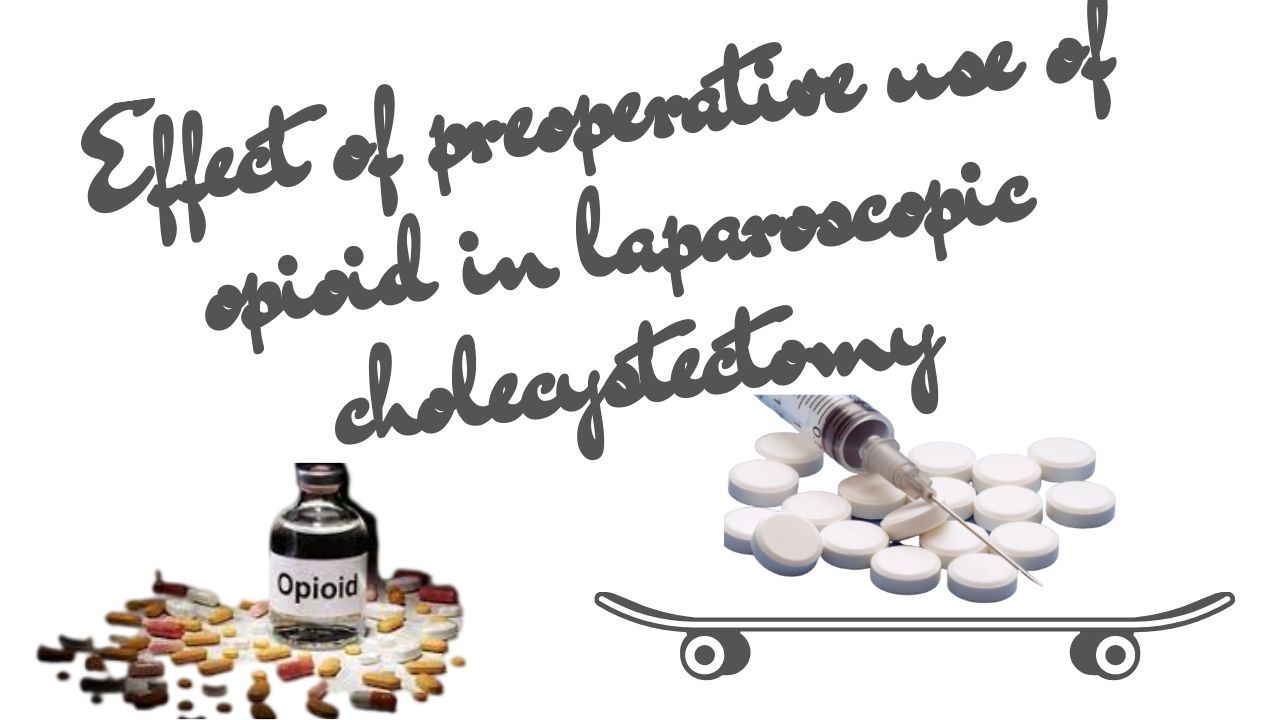
Laparoscopic cholecystectomy (LC) is a common surgical procedure used to remove the gallbladder. It is considered a minimally invasive surgery that can be performed using local anesthesia or general anesthesia. Preoperative opioid use has become a common practice for pain management in patients undergoing LC. Opioids are effective at reducing pain, but they also have side effects such as respiratory depression, nausea, and vomiting. The use of opioids in LC has been shown to have both positive and negative effects on patients. This essay will explore the effects of preoperative opioid use in LC, including the benefits, risks, and potential alternatives.
Benefits of Preoperative Opioid Use in LC
Pain Management
The primary benefit of preoperative opioid use in LC is pain management. Opioids are highly effective at reducing pain, which can be beneficial for patients who experience postoperative pain. Pain after LC can be caused by surgical trauma, inflammation, or gas irritation. Opioids can be used to manage this pain and improve patient comfort. Opioids are also useful for managing breakthrough pain, which is pain that occurs despite the use of other pain management strategies.
Improved Patient Satisfaction
Preoperative opioid use may also improve patient satisfaction. Patients who experience less pain and discomfort after surgery are more likely to be satisfied with their surgical experience. This can improve patient outcomes and reduce the risk of complications.
Risks of Preoperative Opioid Use in LC
Respiratory Depression
One of the major risks of preoperative opioid use in LC is respiratory depression. Opioids can depress the respiratory system, leading to reduced oxygen levels in the blood and potentially causing respiratory failure. Respiratory depression is a serious complication that can be life-threatening. Patients with underlying respiratory conditions or who are at risk of obstructive sleep apnea are at increased risk of respiratory depression.
Nausea and Vomiting
Opioids can also cause nausea and vomiting, which can be uncomfortable for patients and may delay recovery. Nausea and vomiting can lead to dehydration, electrolyte imbalances, and impaired wound healing.
Sedation
Preoperative opioid use can also cause sedation, which can impair cognitive function and delay recovery. Patients who are sedated may have difficulty communicating with healthcare providers and may be at increased risk of falls and other injuries.
Potential Alternatives to Preoperative Opioid Use in LC
Multimodal Analgesia
Multimodal analgesia is an approach to pain management that involves the use of multiple pain management strategies. This may include non-opioid pain medications, such as nonsteroidal anti-inflammatory drugs (NSAIDs) and acetaminophen, as well as regional anesthesia and nerve blocks. Multimodal analgesia has been shown to be effective at reducing pain and improving patient outcomes without the risk of opioid-related side effects.
Enhanced Recovery After Surgery (ERAS)
ERAS is a multidisciplinary approach to surgery that focuses on optimizing patient outcomes and reducing the risk of complications. ERAS protocols may include preoperative education, early mobilization, and a multimodal approach to pain management. ERAS has been shown to be effective at reducing the use of opioids and improving patient outcomes.
Recent Studies on Preoperative Opioid Use in LC
Several recent studies have examined the effects of preoperative opioid use in LC. A study published in the Journal of the American College of Surgeons in 2018 found that preoperative opioid use was associated with longer hospital stays and increased postoperative complications, including infections and respiratory failure. The study also found that patients who used opioids preoperatively were more likely to require readmission within 30 days of surgery.
Another study published in the Journal of Pain Research in 2019 found that preoperative opioid use was associated with increased postoperative pain and a higher risk of chronic opioid use after surgery. The study also found that patients who used opioids preoperatively had longer hospital stays and higher healthcare costs.
Alternatives to Opioid Use in LC
Multimodal analgesia and ERAS protocols are effective alternatives to preoperative opioid use in LC. Multimodal analgesia involves the use of multiple pain management strategies, such as NSAIDs, acetaminophen, regional anesthesia, and nerve blocks. ERAS protocols involve a multidisciplinary approach to surgery that focuses on optimizing patient outcomes and reducing the risk of complications. ERAS may include preoperative education, early mobilization, and a multimodal approach to pain management.
Conclusion
Preoperative opioid use in LC has both benefits and risks. Opioids are effective at reducing pain, but they can also cause side effects such as respiratory depression, nausea, and vomiting. Recent studies have found that preoperative opioid use is associated with longer hospital stays, increased postoperative complications, and a higher risk of chronic opioid use. Alternative approaches to pain management, such as multimodal analgesia and ERAS, may be effective at reducing pain and improving patient outcomes without the risk of opioid-related side effects. Healthcare providers should carefully consider the risks and benefits of preoperative opioid use and work with patients to develop a pain management plan that meets their individual needs.






